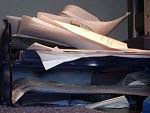Neuroscience
 Eye-catching studies that didn't make the final cut:
Eye-catching studies that didn't make the final cut:
Wooah ... how babies learn to walk down slopes.
They may have come in for some recent criticism regarding their carbon pawprints, but elsewhere yet another previously untapped canine skill has been revealed - the ability to understand that iconic replicas stand for real objects.
In the psychiatrist's chair: in-depth interviews reveal how 22 neurologists understand conversion disorder.
Psychoanalysis for kids - does it work?
Neuroculture: neuroscientific knowledge is not solely constrained within laboratories, but readily captures the attention of the public at large.
People's attitudes explain their willingness, or not, to seek help for depression.
Rethinking NIMBYism: The role of place attachment and place identity in explaining place-protective action.
What ever became of Little Albert?
What does having a fertility problem mean for couples?

- Extras
Eye-catching studies that didn't make the final cut: Voodoo correlations are everywhere, not just in neuroscience. [Background]. More stats controversy. "There are four major problems with using p as a measure of evidence and these problems are often...
- Extras
Eye-catching studies that didn't make the final cut: Inhalation of carbon dioxide triggers panic attacks in healthy participants who don't suffer from panic disorder. GPs are reluctant to discuss the issue of their patients being overweight. How...
- Extras
Eye-catching studies that I didn't get a chance to report on in full: The personality profile of people who get bullied at work. Adults with autism are better than healthy controls at dividing their attention. The biological basis of the nocebo...
- Extras
Eye-catching studies that didn't make the final cut this fortnight: The right dorsolateral prefrontal cortex plays a vital role in our willingness to punish unfair behaviour by others, even at a cost to ourselves. The boundaries between different...
- Cognition In Babies
Newsweek's cover story for Aug 15 is all about "Your Baby's Brain". Reads like a literature review lite on cognition in babies -- fascinating, and simple enough for non-scientists to understand. That's the way I like my cognitive science!...
Neuroscience
Extras
 Eye-catching studies that didn't make the final cut:
Eye-catching studies that didn't make the final cut:Wooah ... how babies learn to walk down slopes.
They may have come in for some recent criticism regarding their carbon pawprints, but elsewhere yet another previously untapped canine skill has been revealed - the ability to understand that iconic replicas stand for real objects.
In the psychiatrist's chair: in-depth interviews reveal how 22 neurologists understand conversion disorder.
Psychoanalysis for kids - does it work?
Neuroculture: neuroscientific knowledge is not solely constrained within laboratories, but readily captures the attention of the public at large.
People's attitudes explain their willingness, or not, to seek help for depression.
Rethinking NIMBYism: The role of place attachment and place identity in explaining place-protective action.
What ever became of Little Albert?
What does having a fertility problem mean for couples?

- Extras
Eye-catching studies that didn't make the final cut: Voodoo correlations are everywhere, not just in neuroscience. [Background]. More stats controversy. "There are four major problems with using p as a measure of evidence and these problems are often...
- Extras
Eye-catching studies that didn't make the final cut: Inhalation of carbon dioxide triggers panic attacks in healthy participants who don't suffer from panic disorder. GPs are reluctant to discuss the issue of their patients being overweight. How...
- Extras
Eye-catching studies that I didn't get a chance to report on in full: The personality profile of people who get bullied at work. Adults with autism are better than healthy controls at dividing their attention. The biological basis of the nocebo...
- Extras
Eye-catching studies that didn't make the final cut this fortnight: The right dorsolateral prefrontal cortex plays a vital role in our willingness to punish unfair behaviour by others, even at a cost to ourselves. The boundaries between different...
- Cognition In Babies
Newsweek's cover story for Aug 15 is all about "Your Baby's Brain". Reads like a literature review lite on cognition in babies -- fascinating, and simple enough for non-scientists to understand. That's the way I like my cognitive science!...
